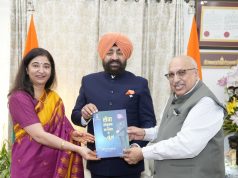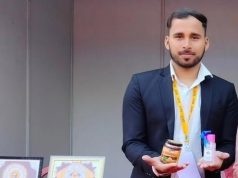By OUR STAFF REPORTER
Dehradun, 25 Dec: Dr M Muruganandam, Principal Scientist and Head of the PME & KM Unit at ICAR-Indian Institute of Soil and Water Conservation (ICAR-IISWC), here, conducted a field exposure visit on 24 December for officer trainees currently participating in a four-month regular training programme on Soil and Water Conservation and Watershed Management.
The visit provided trainees with insights into river ecosystems and farming-based field models. At the Yamuna River near Dakhpathar, Dr Muruganandam introduced the trainees to various in-stream habitats, including glides, riffles, rapids, falls, and pools, as well as off-stream habitats such as riparian zones and riverbanks. The trainees were educated on the components of river ecosystems – plankton, benthos, epiphytes, and macro-algae and methods for their quantification and health assessment.
Dr Muruganandam emphasised the scientific methods advocated by the Institute for river-bed material (RBM) extraction, focusing on the sustainable removal of sand and stone. He sensitised the trainees to the possible ecological impacts of RBM extraction on riverine ecosystems, river course dynamism, sediment delivery, etc., and the measures needed to mitigate its effects on river courses, habitats, biodiversity, and riverbank erosion.
Earlier in the day, Dr Muruganandam demonstrated fish farming systems at the Uttarakhand State Fish Hatchery, Dhakrani. The trainees were introduced to key aspects of fish farming, including breeding techniques, management of nursery pond systems, table-size fish production ponds, and fish production practices such as water quality monitoring, feeding, and fish health maintenance.
Dr AK Sharma, Senior Scientist-cum-Head at KVK Dhakrani, highlighted the benefits and potential of the dual-purpose Barbari breed of goats, suitable for milk and meat production. He also demonstrated compost production using improved earthworm breeds, high-tech vegetable farming, successful orchard practices, and sensor-based irrigation systems.
The officer trainees engaged with the staff at the Fish Hatchery and KVK Dhakrani for hands-on learning and first-hand information. The field visit covered diverse models, including fish farming, fish hatcheries, goat rearing units, and river ecosystem management, aimed at fostering resource conservation and livelihood security. This current training batch is the 128 conducted by IISWC, with 24 officer trainees from various states across India participating from 8 October 2024 to 7 February 2025.








